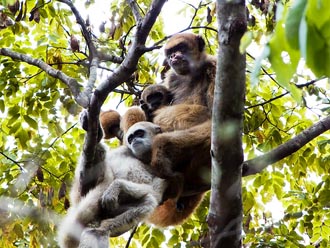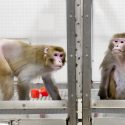Study: Monkey mothers key to reproductive success of sons
If you are a male human, nothing puts a damper on romantic success like having your mother in tow. If you are a male northern muriqui monkey, however, mom’s presence may be your best bet to find and successfully mate with just the right girl at the right time.

A muriqui monkey mother, infant and juvenile son are shown in their Brazilian forest habitat in 2011. According to new research by Karen B. Strier, a UW professor of anthropology, it is monkey mothers who pull the strings in muriqui society to the reproductive advantage of their male offspring. Photo: Carla B. Possamai
In a study of wild primates, reported this week (Nov. 7, 2011) in the Proceedings of the National Academy of Sciences, University of Wisconsin–Madison anthropologist Karen B. Strier describes a monkey society where equality and tolerance rule, and where sexually mature males, still living at home, seem to get helpful access to mates by the mere presence of their mothers and other maternal kin.
The new study, which combines Strier’s long-term behavioral studies of wild muriquis with new genetic assays obtained from their scat, is important because it can inform conservation practices for critically endangered primates. But the study’s big surprise, says Strier, was evidence that could extend the ‘grandmother hypothesis,’ the notion that human females evolved to live well past their reproductive years because of the rearing advantages conferred by post-menopausal women on their grandchildren. View a video about Strier’s work here.
The northern muriqui is a large, long-lived, socially complex and critically endangered New World primate. There are at most 1,000 animals left in patches of the Brazilian Atlantic Forest , the only place the species is found.
The monkey has been the subject of intensive behavioral study by Strier and her Brazilian colleagues for nearly three decades. Muriqui culture stands in stark contrast to many other primate societies: It is egalitarian and peaceful, and reproductive success, it seems, is spread evenly across the males of a group instead of determined by male social rank, as it is in most other species.
“The new data show who’s pulling the strings in muriqui society,” says Strier. “It’s the mothers.”
Genetic data from 67 monkeys — infants, mothers and possible sires — was gathered from monkey feces and analyzed with collaborators Sérgio Mendes and Valéria Fagundes of the Universidade Federal do Espirito Santo, Brazil; Anthony Di Fiore of the University of Texas at Austin; and Brazilian graduate student, Paulo Chaves at New York University. The genetic results, says Strier, neatly validate decades of behavioral studies, and provide a new window into muriqui society as Strier and her group could see, for the first time, paternal relatives across generations in highly stable social groups.
“We knew from long-term behavioral studies that mothers, who can live into their 30s, stay with their sons for a lifetime,” explains the Wisconsin anthropologist, “but the unexpected part of the story is that there may be reproductive advantages as a result of this living arrangement.
“It would be really interesting now to look at paternity in other muriqui populations and in other species where mothers and sons stay together for life, to see if there are similar maternal effects,” says Strier.
The new research may also help explain why muriqui monkey females are so long lived.
The genetic data used in the study reveal that paternity in the group is more evenly spread across potential fathers, with 22 infants sired by 13 different males. The most successful male fathered just 18 percent of infants, a far lower percentage than reported for other primate species living in multi-male groups. According to Strier, it can be difficult to tell from behavioral observations who’s a father and who isn’t, as muriqui males often line up patiently to mate with ovulating females.
“What we see is that no one male is monopolizing reproduction,” explains Strier. “The pattern is that a lot of different males are siring infants, confirming what we had predicted from their behavior.”
Strier’s studies have shown that in muriqui society, males stay in the groups they were born in while most females migrate to other groups at 6 or 7 years of age.
Intriguingly, no infants were the result of mating between males and a close maternal relative. “The finding that no inbreeding is occurring is important,” Strier avers. “Mating may be less random than we think because of the influence of mothers and other maternal kin. There must be some mechanism of recognition or avoidance.”
This is a crucial discovery, given that the 300 or so muriquis in Strier’s study population (representing nearly one-third of the entire species) are found in a protected reserve, where they are isolated from other muriquis.
The new PNAS report and supporting data open a vital new perspective on primate social dynamics, Strier says: “Are we seeing mega moms? Or is this really just about being with your mom?”
The new study, says Strier, will also help with muriqui conservation, as what little muriqui habitat remains is fragmented. The data suggest that this muriqui population may be large enough for its members to avoid close inbreeding, so protection aimed at preserving and expanding habitat for existing groups would suffice.
At the same time, the influence of mothers and other maternal kin on male reproduction suggests the importance of extended families in this species. If animals living in smaller populations ever need to be relocated for conservation purposes, they should be moved with great care, Strier notes.
Tags: animal research, anthropology, primates, research



